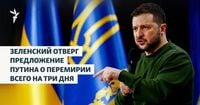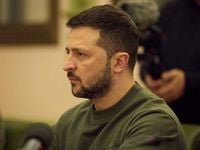Ukrainian President Vladimir Zelensky has firmly rejected Russian President Vladimir Putin's proposal for a ceasefire during the upcoming 80th anniversary celebrations of Victory in the Great Patriotic War. The proposed ceasefire would have lasted from May 8 to May 11, 2025, but Zelensky has called for a more extended, 30-day ceasefire instead.
In a statement reported by Interfax-Ukraine, Zelensky described Putin's offer as "more of a theatrical production from his side." He emphasized that a mere three-day ceasefire would not allow for any meaningful negotiations or agreements to take place. "Why a ceasefire for 30 days? Because it is impossible to negotiate anything in three, five, or seven days," he asserted during a press conference.
Moreover, Zelensky expressed doubts about the safety of foreign leaders who might attend the Victory Day parade in Moscow on May 9, stating that Ukraine cannot guarantee their security. He remarked, "Ukraine will not play games to create a pleasant atmosphere allowing Putin to emerge from isolation on May 9." This reflects a broader sentiment among Ukrainian officials that any temporary ceasefire would not lead to genuine peace efforts.
Putin's announcement of a ceasefire was made on April 28, 2025, with the intention of halting all military actions during the commemorative days. However, Zelensky's response indicates a clear unwillingness to accept what he perceives as a superficial gesture by the Kremlin. Instead, he advocates for a more robust ceasefire agreement, adhering to a model proposed by the United States.
In his comments, Zelensky pointed out that the Russian initiative appears to be an attempt to create a favorable image for Putin during the celebrations, allowing him to step back from international isolation. He stated, "This is just not serious or very serious. We are either at war, or Putin shows that he is ready for a ceasefire, for the first part of ending the war."
While the Kremlin has framed the ceasefire as a goodwill gesture, Zelensky's administration remains cautious. The Ukrainian President has previously warned that any foreign dignitaries visiting Russia during this time could be at risk. "We do not recommend visiting the Russian Federation from a security standpoint. And if you do, don't ask us. It is your personal decision," he advised.
As tensions remain high in the region, Zelensky's administration is not only focused on immediate military concerns but also on the long-term implications of any ceasefire agreement. On April 30, Andriy Sybiha, the Deputy Head of the Office of the President of Ukraine, mentioned that Kyiv would be open to a ceasefire lasting 60 or 90 days, contingent upon Russian agreement.
This ongoing dialogue surrounding ceasefire terms underscores the complexities of the conflict, as both sides navigate the challenges of diplomacy amidst military actions. Zelensky's rejection of Putin's proposal reflects a broader strategy aimed at securing a more sustainable and long-term peace solution rather than temporary measures.
The situation remains fluid, and both leaders' positions could evolve as the date of the proposed ceasefire approaches. The international community continues to watch closely, hoping for a resolution that could bring about an end to hostilities.
In the meantime, Zelensky's insistence on a 30-day ceasefire highlights his administration's commitment to a serious and substantive approach to peace negotiations. The Ukrainian President's rejection of a short-term ceasefire indicates a desire for a more comprehensive framework that could potentially stabilize the region and foster dialogue.
As the world commemorates the 80th anniversary of Victory Day, the contrasting narratives from Ukraine and Russia reveal the deep divisions that persist. Zelensky's call for a more extended ceasefire serves as a reminder of the ongoing struggles faced by Ukraine and the complexities of achieving lasting peace in a region marked by conflict.
Ultimately, the path to peace remains uncertain, with both sides entrenched in their positions. Zelensky's leadership and the responses from the international community will play crucial roles in determining the future trajectory of the conflict.


